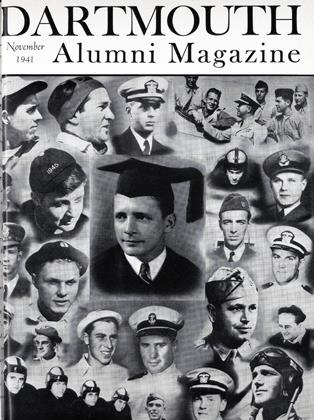And it all falls into a rather deep-brown funk when the student body is seeking the advantages of the College without seeking the substance of the College. The honest effort of Dartmouth as an institution to preserve its influence and its value to the Nation falls easy prey to the atomization of individual aims and individual indecisions when the student body reflects as accurately as it does the indecisive character of the Nation as a whole in this war. The College's aim to help build men who will "....build the old waste places... .raiseup the foundations of many generations... .and. .. .be called, The repairer of thebreach, The restorer of paths to dwell in," as President Hopkins found expression for it in his Convocation Address, becomes lost in the pervasive mist of disproportionate and half-realized aims.
What the College does about it is probably the best it can. But there seems little doubt that most of the men taking Defense Courses read the words "maximum usefulness" in the Defense Bulletin to mean the maximum usefulness of a little math or physics to them as individuals. And College-recommended deferments are the hope of most of the students eligible for the draft. And the College goes on in this atomization of aims working for its own aim of keeping the College together, which means in the great number of cases, working against a democratic army and for special deferments and officerships for College men.
The total effect is a split between the aim of a College avowedly preparing men for maximum usefulness in a nation at war and the reality of a College of individuals seeking escape or furlough from a complete recognition of the war. So far this year the College has been made up of individuals growing away from the central core of realistic thinking in terms of a whole College working in a whole nation threatened in a war in which indecision has thus far spelled death or slavery.
However unified the College manages to appear in its expressions of enthusiastic freedom, it fundamentally makes manifest its concern for a last fling on the old campus before marching off at last to serious business. Tearing the Statler apart in Boston, filling the road to Hamp on Fridays and Saturdays, making every home football game a big week-end—it all feels good and looks good to every undergraduate, and leaves buried somewhere back in September the words of the President of the College: "To the extent that there beany among you without the seriousness ofpurpose to strive, without the ambition toknow, and without the will to do, the effectiveness of the College as an agency ofhelpfulness in a troubled world is weakened."
 View Full Issue
View Full Issue
More From This Issue
-
 Lettter from the Editor
Lettter from the EditorLetters From Bolte
November 1941 -
 Article
ArticleDistinctive Student Achievement
November 1941 By BILL CUNNINGHAM '19 -
 Class Notes
Class Notes1917*
November 1941 By EUGENE D. TOWLER, DONALD BROOKS -
 Article
ArticleThe New Freshman Class
November 1941 By DEAN CHAMBERLIN '26 -
 Sports
SportsBig Green Teams
November 1941 By Whitey Fuller '37 -
 Class Notes
Class Notes1938*
November 1941 By CARL F. VONPECHMANN, J. CLARKE MATTIMORE, DAVID J. BRADLEY
Craig Kuhn '42
-
 Article
ArticleThe Undergraduate Chair
June 1941 By Craig Kuhn '42 -
 Article
ArticleThe Undergraduate Chair
October 1941 By Craig Kuhn '42 -
 Article
ArticleThe Undergraduate Chair
November 1941 By Craig Kuhn '42 -
 Article
ArticleThe Undergraduate Chair
December 1941 By Craig Kuhn '42 -
 Article
ArticleJUST A MATTER OF FRAILTY
December 1941 By Craig Kuhn '42 -
 Article
ArticleThe Undergraduate Chair
February 1942 By Craig Kuhn '42
Article
-
 Article
ArticleGROUP OF FRATERNITIES BUILDS NEW YORK CLUB
December, 1922 -
 Article
ArticleNew Administrators
October 1947 -
 Article
ArticleGordon P. Chipman '26
JUNE 1963 -
 Article
ArticleGREEN JOTTINGS
FEBRUARY 1968 By ALBERT C. JONES '66 -
 Article
ArticleCOMMENCEMENT 1983 ADDRESSES and CITATIONS
JUNE 1983 By The Reverend Warner B. Traynham '57 -
 Article
ArticleMEMORIAL
April 1945 By William Bronk '38

